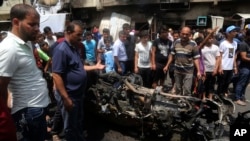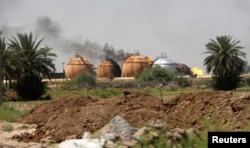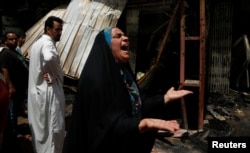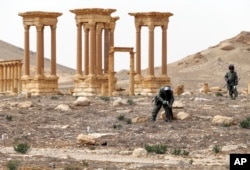Islamic State militants have returned to using vehicle-borne improvised explosive devices for a bombing campaign in Baghdad and elsewhere in Iraq.
The terror group staged five attacks Sunday, including one at a natural gas facility north of the capital killing at least 15 people, Iraqi security officials say. The five attacks left more than 100 Iraqis dead.
For most of this year, the militants had been using bombers wearing suicide vests to trigger blasts, but since April, IS has again started to trigger massive car bombs, and the resurgence suggests a weakening ability of the Iraqi Security Forces, distracted by political protests, to protect the greater Baghdad area.
According to Patrick Martin, an analyst with the Washington-based Institute for the Study of War, the blasts are aimed at further roiling Iraqi politics and undermining an increasingly fragile government.
“These explosive attacks will play a major factor in the ongoing political dynamics in Baghdad and aggravate already tense relations between the government and protesters, if the government fails to guarantee basic security in the city,” he said.
As far as Iraqi officials are concerned, the attacks are a sign of IS desperation, retaliation for the recent battlefield setbacks the group has suffered in Iraq and neighboring Syria. Last Wednesday, three separate car bombings in Baghdad killed at least 93 people in one of the deadliest days in Iraq this year.
Prime Minister Haider al-Abadi has acknowledged IS is seeking to take advantage of the country's political crisis over the pace of political reform and the overhaul of a quota-based governing system.
Militants desperate, deadly
U.S. officials also have been hammering the argument the series of increasingly deadly attacks in Iraq should be seen as the militants' effort to make up for the loss of territory in their self-styled caliphate. At a news conference Sunday in Baghdad, Brett McGurk, President Obama’s envoy to the 66-member international anti-IS coalition, said, “This perverse caliphate is shrinking.”
IS, however, is showing it remains a vicious and unpredictable foe that is quick to exploit any weaknesses shown by enemies.
The terrorist-style attacks in Iraq have focused on softer, civilian targets. The bombing near Latifiyah was at a shopping area. Elsewhere in Baghdad, three separate bomb attacks targeted commercial areas, killing at least eight civilians and wounding 28 others, Iraqi officials said.
The attack on the state-run natural gas plant at Taji in Baghdad's northern outskirts forced two power stations to suspend electricity production. That coordinated attack began when a vehicle exploded at the entrance to the gas facility - allowing another one carrying six bombers with explosive vests to enter the plant. When Iraqi reinforcements arrived, the militants set off a vehicle parked nearby.
IS has also been launching new ground offensives.
Attack, counterattack
In Syria, a re-grouping of militant forces near the ancient city of Palmyra, which saw IS severing a major supply route last week from the city of Homs, has prompted a fierce military response from the government of Bashar al-Assad, say local activists.
Russian and Syrian warplanes have been launching airstrikes on the militants, who have made major advances in the al-Mazar Mountains northwest of Palmyra, which Syrian government troops recaptured in March.
IS fighters are now within 10 kilometers of Palmyra and surrounding the city on three sides. Additionally, the group has launched a concerted assault on government strongholds in the eastern Syrian city of Deir al-Zor.
U.S. envoy McGurk said the coalition will not let up pressure on IS. He said significant intelligence gathered by U.S. Special Forces in a raid in eastern Syria last year has assisted the coalition in better targeting militant leaders.
“We will be beginning over the coming weeks and months a pressure campaign on Raqqa in all its aspects,” he said, referring to the de facto IS capital in Syria.
And in Iraq, McGurk said, “We are doing precision strikes in Mosul almost every day. There is constant synchronized pressure.”














